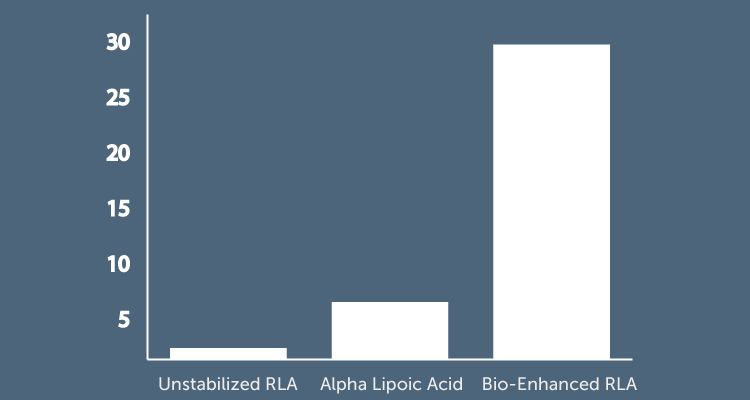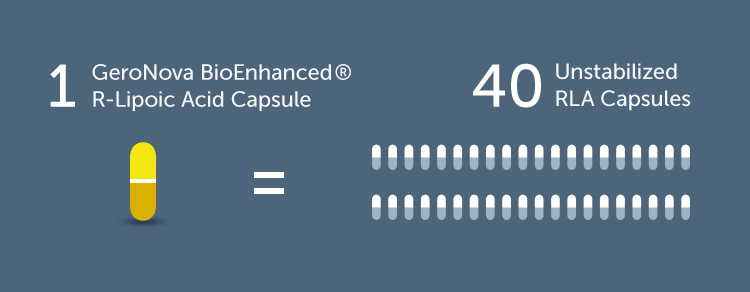- Haiku, HI
- info@geronova.com
- © Copyright 2023 GeroNova® Research, Inc. All Rights Reserved
- Powered by DIGITAL MULES
$43.44
GeroNova’s Bio-Enhanced® R-Lipoic Acid in the form of Na RALA has demonstrated superior bio-availability, stability and potency.
We believe that being healthy is essential to being happy. Suffering from pain, inflammation and the other effects of aging can be soothed by self-care.
Stabilized Bio-Enhanced R-Lipoic Acid is the most natural form of Lipoic Acid, making it significantly more potent and effective than other lipoic supplements on the market, allowing you to fully enjoy its health benefits while calming and reducing age-related symptoms.
| Weight | 4.16 oz |
|---|---|
| Dimensions | 4.29 × 2.32 × 2.32 in |
| UPC 000860011861355 | UPC 000860011861355 |
Sodium 30 mg, Bio-Enhanced Na-RALA 300 mg (providing 260 mg of R-Lipoic Acid)
Other Ingredients: vegetable cellulose (capsule), rice flour (non-GMO)
Does Not Contain: Wheat, Gluten, Corn, Yeast, Soy, Egg, Dairy Products, Artificial Colors, Artificial Sweeteners, or Artificial Flavors.
This product uses GeroNova Research’s Bio-Enhanced® R-Lipoic Acid. Bio-Enhanced is a registered trademark of GeroNova Research, Inc.
Take one or more capsule daily, as tolerated, preferrably on an empty stomach or as recommended by a health care practitioner.
Lipoic acid, also known as Alpha-Lipoic acid, (ALA, Thioctic acid) is similar in structure and function to a vitamin. ALA has been widely explored as a beneficial nutrient for a variety of bodily functions involving the nervous, cardiovascular, immune and detoxification systems.*
Alpha-Lipoic acid consists of a 50/50 mixture of the R-(natural) and S-(unnatural) enantiomers that are mirror images of each other and is called a ‘racemic’ mixture. It is the most widely available commercial form of alpha lipoic acid.
While it may come as a surprise, the vast majority of Alpha-Lipoic acid products on the market also contain the unnatural S form of Lipoic acid that is not found anywhere in nature and did not even exist until it was chemically synthesized in 1952. There is evidence that the two enantiomers of Alpha-Lipoic acid have different biological activities.
Much of the research over the past 30 years has been done with racemic Alpha-Lipoic acid because the R form was not commercially available. This was due to its instability and tendency to polymerize once isolated from the S form, and due to the challenges of delivering the R form to the body in bio-available dosage forms compared to racemic Alpha-Lipoic acid.
S-Lipoic Acid (The S (-) enantiomer) is not found in nature. S-Lipoic acid (SLA) is a by-product from chemical synthesis of racemic Alpha-Lipoic acid and may inhibit the most essential properties of the R form, including interactions with proteins, enzymes and genes.
R-Lipoic Acid (the R (+) enantiomer) is the form of lipoic acid that occurs naturally in plants, animals and the human body and is responsible for the specific beneficial effects of Alpha-Lipoic acid. R-lipoic acid (RLA) is the only form that functions as a co-factor for mitochondrial enzymes involved in energy production.
R-Lipoic acid, despite all its potential health benefits, when separated from the S form, is physically unstable. R-Lipoic acid deteriorates relatively rapidly at slightly above room temperature into a sticky insoluble polymer. Moisture and the heat of friction during encapsulation and the compression of tablets are sufficient to initiate this process. Even a partially polymerized product can pose significant problems in the manufacturing and stability of a dosage form. The polymer reduces the dissolution of tablets or capsules, reduces GI absorption and lowers the bio-availability to less than 10%.
Numerous factors affect absorption. Racemic-ALA has poor solubility and absorption from the GI tract, as 20- 30% reaches the plasma vs. an intravenous dose. R-Lipoic acid is even less soluble and polymerizes on contact with the low pH environment of the stomach. Without special processing, R-Lipoic acid is highly unstable and difficult to absorb.
The good news is that GeroNova has developed a way to stabilize R-Lipoic acid and make it much more bio-available – this means more of it is absorbed. In fact, a human trial found that people who took Bio-Enhanced® R-Lipoic Acid achieved blood concentrations of Lipoic acid a full 40 times higher than those who took unstabilized RLA.**
Maximum Absorption in nanograms/mL

GeroNova’s R-lipoic acid supplements:
1 Bio-Enhanced® R-Lipoic Acid capsule = 40 Unstabilized R-Lipoic Acid capsules

Although small amounts of R-lipoic acid are available in food sources such as dark leafy greens, broccoli, beef, and organ meats, supplementation may be needed to achieve significant intake levels.¹²
Scientific studies showing the health benefits of lipoic acid have used doses ranging from 300 mg to 1,800 mg per day. Lipoic acid has generally been found to be safe when administered in recommended doses. Among the rare reported side effects in humans have been skin allergies and gastrointestinal distress.
As lipoic acid may lower blood glucose levels, individuals with diabetes or glucose intolerance should have their blood glucose monitored while taking lipoic acid. They should also consult their physician about adjusting their dose of anti-diabetic medication in order to avoid hypoglycemia¹.
Since the long-term use of lipoic acid has not yet been studied in pregnant women and nursing mothers, these individuals should avoid using lipoic acid until more information is available¹.




